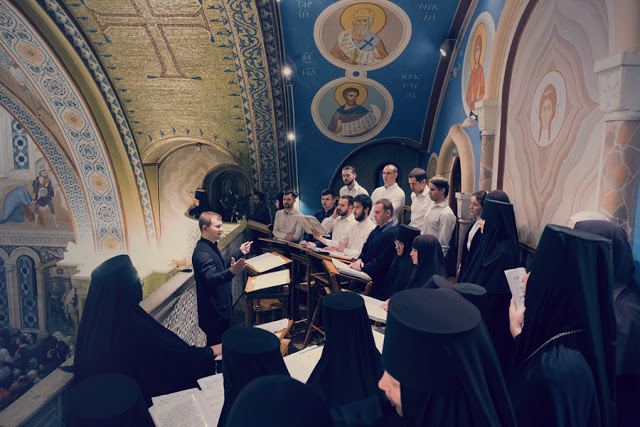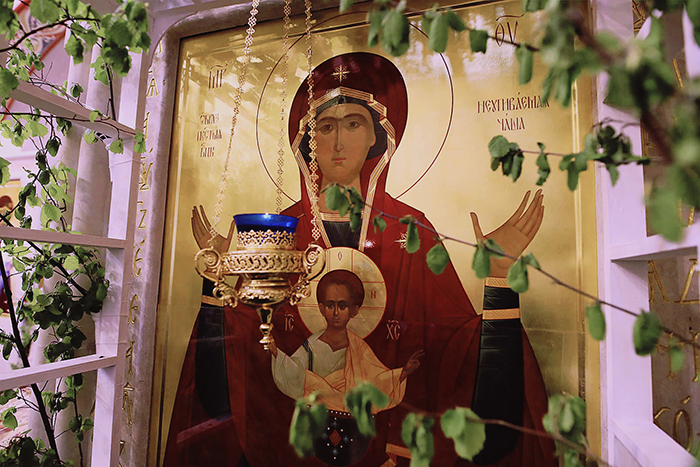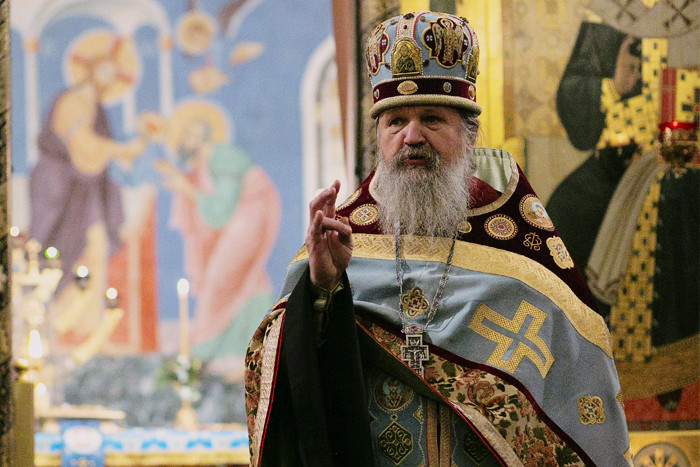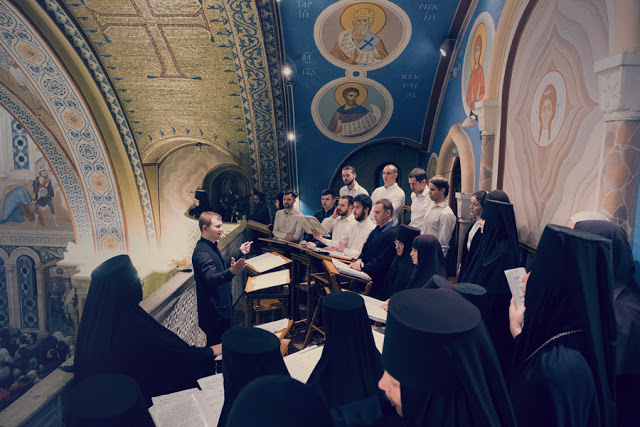
We met with Eugene Prokofiev, the young precentor of the Brothers’ Choir of St. Elisabeth Convent before their performance at the Lenten Concerts. Eugene is 22. He is just a little older than the choir he has directed for the last three years. These three years have become very special for him.
Yulia Krukovskaya, the past precentor of the choir, taught in Minsk Theological College. It was her who invited her student to work with the Brothers’ Choir. Neither Yulia nor Eugene knew that it would change the young man’s course of life.
With the blessing of Father Andrew Lemeshonok, Eugene moved to stay permanently in the Convent. His job of a precentor became his main duty.

— When I came to the Convent, my life changed drastically! — Brother Eugene says. — I can’t imagine myself without the Convent… Living side by side with the nuns and having a close spiritual contact with them all the time, it’s like sitting on a cloud. I seldom leave the Convent now because when you live here, most of your habits and desires go away.
— Brother Eugene, do I get it right that you are a postulant?
— Yes, formally I’m a postulant. However, I’m a postulant who does not plan to proceed any further yet. The longer I live in the Convent, the more often I catch myself thinking of taking the next step and becoming a novice.
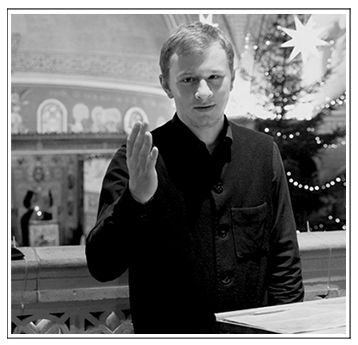
You know, when I first came to the Convent, I thought I would stay here for just a couple of days. Nun Susanna told me to take few clothes to the Convent. I came here to stay. And I’m still here (smiles).
— What are the qualities that a person who wants to be a precentor must possess, in your opinion?
— I can share my own opinion and observations. It seems to me that one must possess a precentor’s charisma and feel the process. You conduct the choir and therefore con-celebrate with the priest. It is not just a job. It is an obedience, especially here in the Convent. It is something you must hold on to tightly. Interestingly enough, there are people who never went through any special training but they can conduct choirs… It depends on that person’s inner state to a great extent. It can only be explained by referring to spiritual things. A person who does not go to church cannot learn to be a precentor. It seems to me that church music is discovered little by little as long as your heart becomes pure and meek…

— Do you believe that spiritual experience is more important for a precentor than professional experience?
— This is what I have come to assume now. When I studied in the college, many of my fellow students used to think that being a precentor meant earning money. It is wrong because who is it that you sing for? The people who come to church are not your audience: they come to pray, not enjoy choir music. A church choir is not just a regular choir; it is specifically designed to facilitate worship. It is God who we sing for during a worship service. This is the basis we have to stand on. The rest comes next… They may pay you or not, it doesn’t matter atall. I’m not getting any money for services. I could’ve been paid but why would I need that money? I live in the Convent and, frankly speaking, I don’t need money at all. Other members of our choir don’t get paid, either. It’s our ministry.
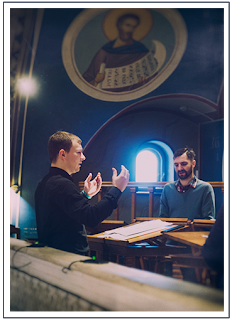
Singing in the Convent during services is very comforting for me and for other singers. We took turns with the Monastic Choir singing the nocturnal Liturgy on the Nativity of Christ and the Theophany. We couldn’t imagine that it was possible! The Monastic Choir is distinguished by its singing manner. The nuns sing quite low. We sing high in comparison with them, and our choir has a distinct singing manner, too. We tried to unite totally disparate manners, so to say. If reactions of the faithful are something to judge by, it was great! We were told that it would happen again. We will sing these nocturnal services together with the sisters at least once a year. It isn’t easy to sing together with another choir. It is a growth factor for the brothers and me. We are honoured by it. The nocturnal antiphonal (responsorial) Liturgy was a hallmark event in the life of our choir.
— Let’s talk about two other important event in the life of your choir. One of them is your first concert appearance. The Brothers’ Choir takes part in the Lenten concerts. What will your repertoire consist of?
— The slogan of the Lenten concerts is “Reviving Cultural Traditions”. That’s why aside from church chants we will include two rare canticles in our programme. One of these canticles was composed in the 16th century. It is an artful narrative about numbers. It explains what each of the numbers means in the Orthodox world. The other canticle, “When I Was Young,” resembles the famous “Haze Over Water,” but its main character is male. Plus, due to the fact that the concert will take place in the hall of the Belarusian State Pedagogical University on March 2, I believe that the secular audience will be interested to hear the chants that we sing in the Convent.
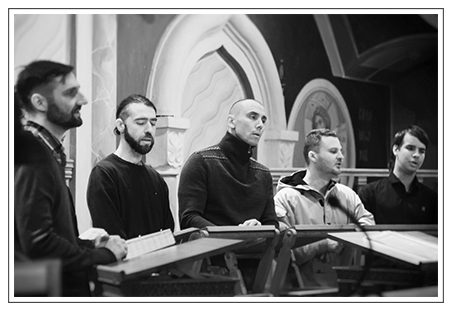
— The second event is the release of the first album by the Brothers’ Choir. What pieces will it contain?
— We would like to showcase the chants that the choir does not always sing during Liturgies. Some of the chants are little-known. There is a demand for this album: people often come to me after the services where we sing and ask me where they could find our recordings and sheet music. We have already recorded half of the album. We will record several other tracks on March 8. The album will hopefully be released by autumn.
— When does your choir perform live in the Convent?
— Several singers of our choir sing during church services on Monday evenings and Tuesday mornings. The entire choir sings during the second (sometimes the third) Liturgy on Sundays. We also sing during Liturgies that are celebrated in the Boarding Home every Friday. We use Valamo obikhod chant. I write to Father Diodor and Father Ambrose who conduct the choirs of Valaam Monastery, asking them to send me their sheet music so as to make sure that our singing corresponds to the authentic chant as closely as possible.
I make musical treatments of some chants for the Brothers’ Choir, too. I add few changes to the original tune, though. I listen to many little-known choirs and record by ear numerous chants that we perform during services. I reckon that church singing is a creative process. If you have printed scores, it doesn’t mean you can’t move them around. Sure, you have to follow certain guidelines and not trespass them but you have the right to add minor changes here and there if the final result sounds better after treatment.
— Eugene, most of your singers are older than you. Could you please share what you as a precentor and just as a person have learned from the brothers in these three years?
You know, when I conduct the choir during a church service — a young boy among twelve bearded men — I don’t want to behave like a child. I have to comply with the standards set by those men: I mean the way they behave and their spiritual maturity. Each brother has a certain quality that I would like to imitate, and I try imitating them. All singers treat me with respect and sympathy. Even if I do or say something wrong due to my young age or lack of experience, they accept it humbly. I’m very grateful to all the brothers!
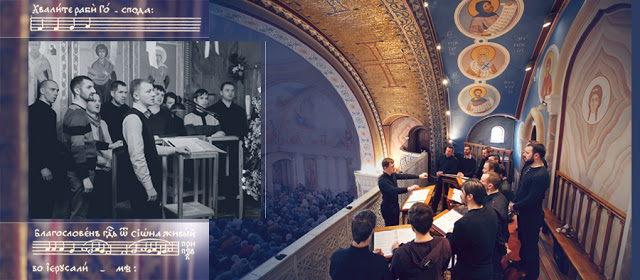
Yulia Krukovskaya was the second precentor in the history of the Brothers’ Choir. She conducted this choir for a decade:
— I had to move to another city. That was why I was looking for someone to be my successor as the precentor of the Brothers’ Choir. I thought that one of my students at the theological college could be the perfect match for this job. It seemed more appropriate if the new precentor was male. I offered this post to Eugene Prokofiev. I was hoping that he would prove worthy of my trust, and so he did. Eugene was afraid that he would not cope with the choir but he agreed to give it a try. He started coming to our rehearsals. Eventually, I realised that I had made the right choice.
Nun Juliania (Denisova), the Precentor-in-Chief of St. Elisabeth Convent:
— Our Brothers’ Choir is a unique phenomenon. These amateurs have already magically turned into professionals, without even knowing it.
To a large extent, it happened thanks to Eugene Prokofiev, who is amazing! Although he is young, he can listen properly and has his own concept of singing. He is able to insist on his own handling of various pieces. He can sing very well and shows how to sing with his own example. All singers follow him. It’s evident that God helps him.
It is very exciting to talk with Eugene and to look at what he does. I am curious to see how the choir develops its professionalism and how the choir members trust Eugene — and they do trust him indeed; otherwise, the choir wouldn’t sound so good. They sing very well, like the Valamo choirs! They have a unique sound, if we speak of church singing. Our professional choirs can’t attain this kind of sound. Eugene is in constant search of new music to add to the choir’s repertoire. He keeps asking me for new sheet music and showing me his treatments and harmonisations. That is why it has become clear that the choir needs to participate in concerts and record its own album.


